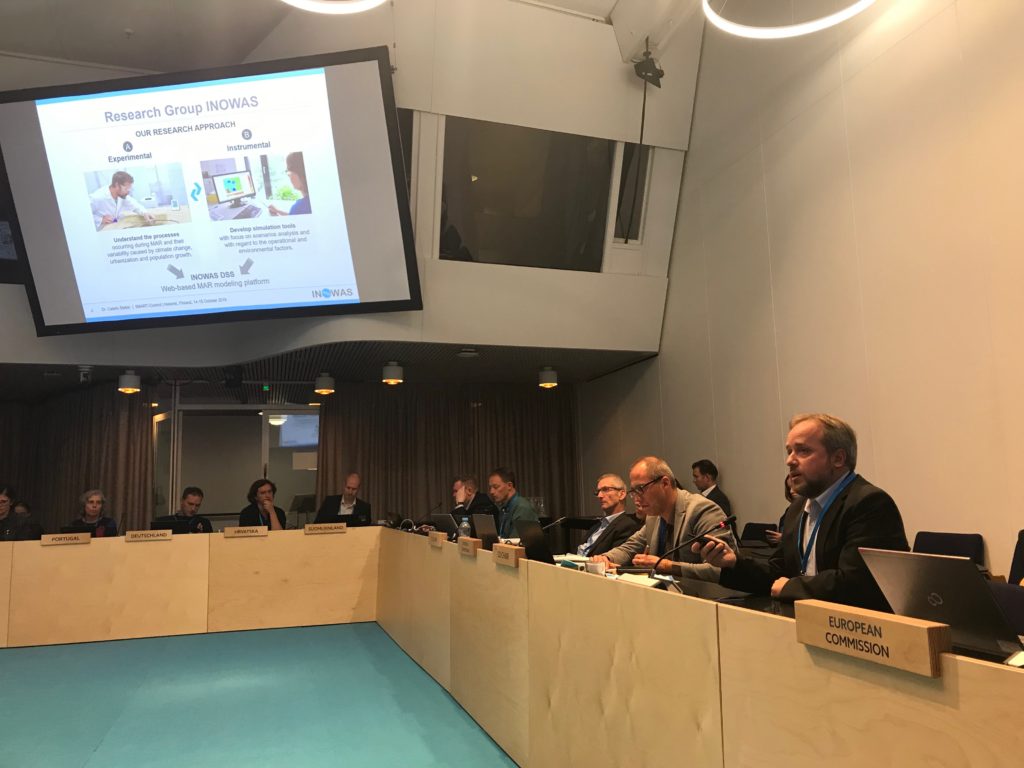The European Commission launched in 2001 the Common Implementation Strategy (CIS) for the Water Framework Directive (WFD), an initiative aiming to secure successful implementation of the core legislation in the European Union. Within CIS, five different working groups (WGs) with representatives from all EU Member States and associated institutions are meeting twice per year to discuss best ways for advancing the implementation of EU policy. The WG on Groundwater is tasked, among others, with “exploring the need and, if necessary, develop a guidance document on aquifer recharge practices that comply with the WFD and Groundwater Directive”. The expected deliverable is a CIS guidance document on aquifer recharge, a very much needed regulatory framework for the safe use of artificial / managed aquifer recharge (MAR) in Europe.
At the invitation of the Finnish Presidency and the European Commission, Dr. Catalin Stefan, head of Research Group INOWAS at TU Dresden, and Prof. Christoph Schüth from TU Darmstadt, attended between 14-15 October 2019 the 37th CIS Working Group Groundwater Meeting in Helsinki, Finland. During the meeting, Mr. Sapiano, CEO of the Energy and Water Agency of Malta and main initiator of the aquifer recharge guideline introduced the background for the need of a specific guidance document on MAR and briefly assessed the existing EU policy related to MAR. Since the use of correct and coherent terminology is paramount, a common understanding of artificial recharge / MAR as well as classification of MAR techniques are needed as a preliminary step in the guideline development. Further key issues include the assessment of the impact of unsaturated soil zone on the mitigation of contaminants, the definition and application of exemptions according to the Groundwater Directive, guidance on a comprehensive risk assessment framework in relation to the application of MAR, guidance on permitting procedures, as well as a clear definition of the allowed infiltration water quality.

Mr. Sapiano also emphasized the existence of a large pool of research initiatives that are addressing the technical aspects related to the application of MAR under various social and hydrogeological conditions. To underline this, Prof. Schüth presented the main results from the EU-funded project MARSOL (http://www.marsol.eu) where MAR solutions were demonstrated at different locations from seven countries. The gained experience shows that MAR can be safely applied as mitigation solutions against droughts and climate change. The excellent research and demonstration activities from MARSOL will be continued in the recently funded project MARsoluT (https://www.marsolut-itn.eu). Dr. Stefan acknowledged the need for a regulatory framework for MAR at EU level and assured the audience about the existence of excellent best practices that can be consulted during the development of MAR guidelines (over 1200 MAR case studies are included in the Global MAR Portal, jointly developed by the INOWAS Group at TU Dresden, Germany and IGRAC, the Netherlands – http://marportal.un-igrac.org). Further, Dr. Stefan introduced the SMART-Control project (www.smart-control.inowas.com), a research project funded under the Water Joint Programming Initiative (Water JPI). The main objective of the project is the development of a web-based, real-time monitoring and control system for MAR applications. The potential relevance of the project in the development of MAR guidelines lies on the role of a real-time monitoring and modeling framework in the understanding, assessment and reduction of risks associated with MAR. In the end, Dr. Stefan also briefly introduced the activities of the Commission on Managed Aquifer Recharge of the International Association of Hydrogeologists (www.recharge.iah.org) and offered support for the dissemination of outcomes at the interface between the science, industry and policy sectors.
The proposed timeline for the development of MAR guideline coincides with the official mandate of the WG Groundwater and spans between 2019 and 2021. The working agenda includes drafting the preliminary risk assessment framework in the first half of 2020, followed by technical discussions on the application of MAR in the member states in the second half of the year and the elaboration of the final document in 2021.